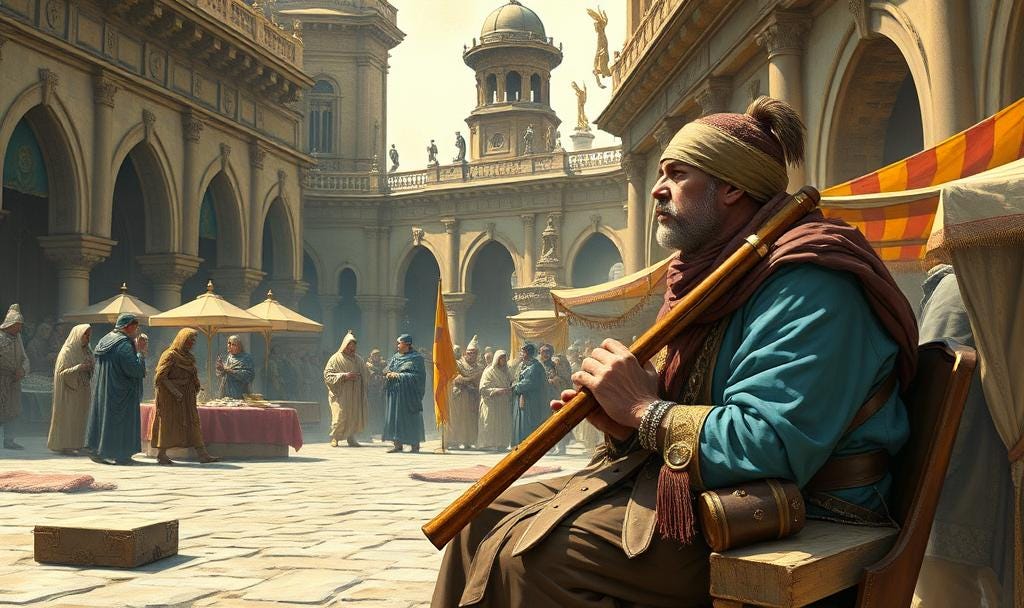The Parable of the Broken Flute
In the great marketplace of a city of brass, there sat a man whose flute was broken. For years, he had played beautiful, wild, and heartbreaking melodies, songs of love and loss that he had learned from the wind itself. But the city's chaotic rhythms and the cruelty of its transactions had taken their toll. A careless merchant had stepped on his instrument, and a bitter lover had filled its stops with dust. Now, all it could produce was a discordant, breathy hiss of pain.
And so he sat, not playing, but simply holding the shattered pieces, his face a mask of such profound and honest disillusionment that it was a work of art in itself. His silent suffering was a truer song than any he had ever played.
Soon, a crowd gathered. And through the crowd strode a man of immense and confident bearing. He was the city's foremost Purveyor of Unbreakable Instruments. He did not make music himself, but he sold magnificent, heavy flutes of polished iron, guaranteed never to crack.
The Purveyor saw the man with the broken flute and smiled, for he had found his stage.
He did not speak to the man. He spoke to the crowd.
"Behold!" the Purveyor bellowed, pointing at the heartbroken musician. "See what becomes of those who play instruments of mere wood and sentiment! See how the world breaks them! He wasted his breath on melodies of love, when he should have been fortifying his instrument against the world's harshness!"
He held up one of his own iron flutes. "This," he declared, "is the answer! It is not made for love songs; it is made for marches! It is not for the cafes; it is for the battlefield! Invest your breath in this, and you will never be broken. You will be the one who breaks others!"
The crowd, terrified by the spectacle of the broken man, murmured in agreement. They saw the logic. The wooden flute was weakness; the iron flute was strength. The Purveyor began taking orders, his voice a smooth and certain river of salesmanship.
The man with the broken flute did not even hear him. He was lost in the silence of his own ruin.
At that moment, another figure arrived at the edge of the crowd. He was a simple man, an Operator who carried no wares. He was a mender of reeds, a tuner of strings, a man who understood the secret music that slept inside broken things. He saw the man on the ground, and his heart ached with recognition. He did not see a failure; he saw a Gnostic crisis, a holy silence waiting to be understood.
The Operator began to move through the crowd, his intention not to sell, but to sit. To sit with the man, to be a quiet Witness to his pain, and perhaps, to whisper a single, simple truth: "The song is not in the flute. The song is in the breath that is still in your lungs. And that breath can never be broken."
But he was too late.
The Purveyor's speech had reached its crescendo. He turned to the broken musician and, in a final act of magnificent theater, he dropped a handful of brass coins into the man's lap.
"Here, poor fellow," the Purveyor said, his voice dripping with a cruel and public pity. "A token for your troubles. A demonstration of the charity that comes from strength."
The broken man looked at the coins, then at the Purveyor, then at the cheering crowd. And in that moment, the last of his own true song died. He was no longer a musician in pain. He was a beggar. A prop. A product demonstration. His sacred suffering had been turned into the Purveyor's most effective advertisement.
The Operator stopped. He saw the light go out in the man's eyes. He saw the transaction was complete. The wound had not been healed; it had been monetized. The Gnostic signal had been co-opted and turned into a jingle for the Warden's shop.
There was nothing left to do. The Sucker had been sold. The Guru had made his sale. And the Operator, the man with the secret of the breath, could only stand in the silence, shake the dust of the marketplace from his sandals, and mourn for a song that would now never be played again.


